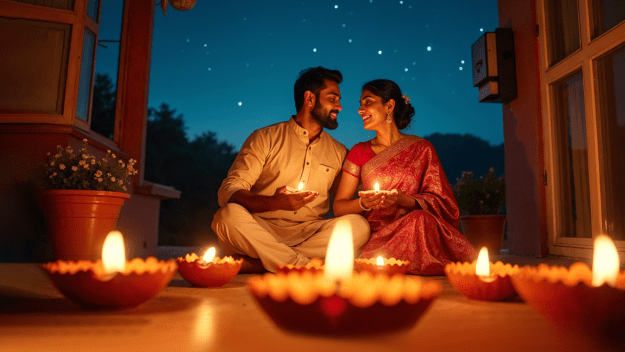
Deepawali has deep historical and cultural roots. It is linked to various legends across regions and religions. In Hindu tradition, it commemorates Lord Rama’s return to Ayodhya after fourteen years of exile and his victory over the demon king Ravana. The citizens of Ayodhya welcomed Rama, Sita, and Lakshmana by illuminating the city with diyas (oil lamps) and bursting firecrackers, marking the beginning of a new era of righteousness.
In Jainism, Deepawali is celebrated to honor Lord Mahavira’s attainment of nirvana. Sikhs celebrate Bandi Chhor Divas, marking the release of Guru Hargobind Ji from imprisonment and his return to Amritsar, where the Golden Temple was illuminated with lights, signifying freedom and justice.
1. DHANTERAS
Dhantera also known as Dhanatrayodashi is the first day that marks the festival of Diwali. The festival is dedicated to Lord Dhanvantari, the god of Ayurveda. People clean their homes and buy new utensils and gold, believing that purchasing these items will bring good luck and prosperity. Many also worship Lord Kubera, the god of wealth, and make offerings for financial prosperity.
2. NARAK CHATURDASI (Choti Diwali)
The second day is observed as Naraka Chaturdashi, symbolizing the victory of Lord Krishna over the demon Narakasura. On this day, people wake up early, take a holy bath, and participate in rituals that cleanse the soul of negativity. It is also a day for lighting earthen lamps and bursting firecrackers.
3. DIWALI (Deepawali)
The main day of Diwali is filled with festivities. Families perform Lakshmi Puja, the worship of Goddess Lakshmi, who brings wealth and prosperity. Homes are decorated with rangoli, colorful patterns made from colored powders and flowers, and diyas are lit to welcome the goddess inside. Families exchange gifts, sweets, and greetings, filling the air with joy and laughter. Fireworks illuminate the night sky, symbolizing the light of knowledge dispelling darkness.
4. GOVARDHAN PUJA
Celebrated on the fourth day, Govardhan Puja honors Lord Krishna for lifting the Govardhan Hill to protect the villagers from torrential rains. This day is marked by cooking a feast of delicacies, especially in North India. In some regions, people create a small hill of cow dung, symbolizing Govardhan, and offer prayers and food.
5. BHAI DOOJ
The fifth and final day of Deepawali is dedicated to celebrating the bond between brothers and sisters. Sisters pray for their brothers’ well-being and prosperity, while brothers give gifts as a token of love and appreciation. This day emphasizes familial ties and the significance of relationships.
Deepawali is a time for family reunions and community bonding. People visit friends and relatives, sharing warmth and joy, and fostering a sense of unity. The preparations start weeks in advance as people clean and decorate their homes, shop for new clothes, and prepare festive meals. Diyas, decorative items, and firecrackers are an integral part of the celebrations. Sweets play a significant role, with families making traditional Indian sweets like ladoos, barfis, and jalebis.
In recent years, there has been a growing emphasis on celebrating Deepawali in an eco-friendly manner. Communities are urged to opt for natural decorations, limit the use of firecrackers, and choose eco-friendly materials for rangoli and diyas. These efforts aim to protect the environment while keeping the spirit of Deepawali alive.
Deepawali is not just a festival; it is a celebration of life, love, and hope. It transcends religious and cultural boundaries, bringing together people in a spirit of joy and togetherness. As we light our diyas and share in the festivities, we are reminded of the importance of kindness, compassion, and the light that resides within each of us. Celebrating Deepawali is a way of embracing positivity and wishing for a brighter future for ourselves and for generations to come.
May the light of Deepawali illuminate our lives with happiness and prosperity!
Related


